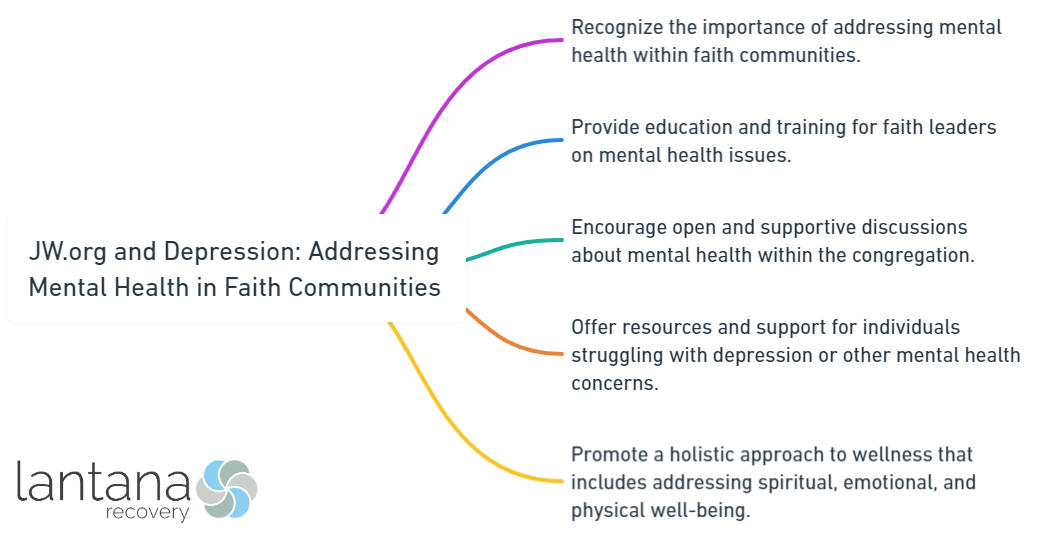JW.org, a widely recognized website and resource for Jehovah’s Witnesses, plays a crucial role in addressing mental health, specifically depression, within faith communities.
The impact of depression in religious communities is a complex issue that requires understanding and support.
Recognizing the stigma surrounding mental health in faith communities is the first step towards addressing this issue effectively.
Breaking down the misconceptions and barriers related to mental health is crucial for creating a supportive and non-judgmental environment.
JW.org understands the significance of mental health and has taken proactive measures to provide support and resources for individuals struggling with mental health issues.
Encouraging open conversations about mental health, education and raising awareness about depression, and collaborating with mental health professionals are some of the approaches JW.org has adopted to address depression within faith communities.
Personal experiences and testimonials of individuals who have overcome depression and highlight the role of faith in mental health recovery are shared to inspire and provide hope.
By addressing depression and promoting mental health wellness, JW.org is actively contributing to the well-being of its faith community.

Understanding Depression in Faith Communities
Depression can have a profound impact on individuals within faith communities, and it is crucial to recognize the stigma surrounding mental health in these contexts. In this section, we will delve into the importance of addressing mental health within faith communities, and how it can positively impact the well-being of individuals. Additionally, we will explore JW.org’s approach to mental health, shedding light on their efforts to provide support and resources for those struggling with depression.
Recognizing the Stigma around Mental Health in Faith Communities
Recognizing the stigma around mental health in faith communities is crucial for promoting support and understanding. It is important to acknowledge that many faith communities still hold misconceptions and stereotypes about mental health, which ultimately leads to stigma and discrimination. The issue of stigma must be addressed to create an environment where individuals seeking support feel accepted and understood.
One effective way to recognize and tackle the stigma is by educating the community about mental health. By providing accurate information and dispelling myths, we can help individuals understand that mental health conditions are not indicative of weakness or a lack of faith. It is essential to emphasize that mental health issues can impact anyone, regardless of their religious beliefs, in order to break down barriers and foster empathy.
Creating a supportive and non-judgmental environment within faith communities is equally important. Faith leaders play a significant role in openly discussing mental health and encouraging dialogue. By doing so, they can help to create a safe and accepting space where individuals feel comfortable expressing their struggles without the fear of judgment or shame.
Collaboration with mental health professionals is also crucial. Faith communities should work with experts to provide resources, support groups, and counseling services. Recognizing and utilizing the expertise of professionals ensures that individuals receive the necessary support and guidance, beyond solely relying on spiritual guidance.
Incorporating these strategies will help to recognize the stigma around mental health in faith communities, promote understanding, and provide the necessary support for individuals seeking help.
If you are more interested in science-based research regarding the symptoms and treatment of depression, read our article on Yale depression research program to know about the latest research on the topic.
The Importance of Addressing Mental Health in Faith Communities
The importance of addressing mental health in faith communities cannot be overstated. Faith communities play a crucial role in supporting individuals struggling with mental health issues by breaking the stigma and creating a safe environment for seeking help. Education and awareness programs within these communities can provide valuable information about mental health conditions and available resources.
Creating a supportive environment within faith communities entails offering emotional support, listening without judgment, and providing a space for sharing experiences. These efforts promote mental well-being and foster a sense of value and understanding.
Collaboration with mental health professionals is paramount in this regard. Faith communities can form partnerships with providers to offer counseling, therapy, and support groups, ensuring that individuals have access to appropriate care.
By addressing mental health, individuals within faith communities can overcome depression and other challenges. Personal experiences and testimonials within these communities have the power to inspire hope and provide encouragement. By highlighting the role of faith in mental health recovery, these communities promote spiritual well-being alongside mental well-being.
JW.org’s Approach to Mental Health
JW.org’s proactive and comprehensive approach to mental health in faith communities addresses the stigma surrounding mental health and provides support for individuals who may be struggling. By incorporating the following strategies, JW.org aims to enhance the well-being of individuals in faith communities dealing with mental health issues.
1. Education and Awareness: JW.org offers accurate information about mental health through its educational resources. These resources explain common mental health disorders and provide guidance on how to recognize and support someone experiencing them.
2. Promoting a Supportive Environment: JW.org promotes a non-judgmental and supportive environment within faith communities. Open discussions about mental health are encouraged to create spaces where individuals feel comfortable seeking help.
3. Collaboration with Professionals: JW.org recognizes the expertise of mental health professionals and encourages collaboration between faith communities and qualified professionals. This collaboration ensures that individuals receive appropriate care and support.
To support this approach, individuals can actively participate in educational programs and engage in conversations about mental health within their faith communities. Creating a non-judgmental and empathetic atmosphere where individuals feel safe to seek help if needed is also crucial.
Remember, an understanding and compassionate approach to mental health is crucial in supporting individuals on their journey towards mental well-being.

Addressing Depression in Faith Communities
Depression is a complex issue that affects individuals across all walks of life, including those within faith communities. In this section, we will delve into how faith communities can address and support those battling depression. From spreading education and awareness about this mental health concern to creating an environment of compassion and acceptance, and even collaborating with mental health professionals, we explore the various ways faith communities can play a crucial role in supporting individuals struggling with depression.
Education and Awareness about Depression
Education and awareness about depression are crucial in addressing mental health issues in faith communities. Individuals need to understand depression, its symptoms, and its impact on mental well-being.
To promote education and awareness about depression, faith communities can take several initiatives. They can:
1. Conduct educational workshops: Organize workshops led by mental health professionals to provide information about depression, its causes, and treatment options. These workshops help people recognize signs of depression and understand its effects.
2. Provide resources: Create and distribute educational materials like brochures or pamphlets with information about depression. Make these resources available in places of worship and online platforms to reach more people.
3. Collaborate with mental health organizations: Partner with mental health organizations to organize awareness campaigns and events. This helps disseminate accurate information and promote mental health resources in the community.
4. Support groups: Establish support groups specifically for individuals dealing with depression. These groups provide a sense of community and a safe space for sharing experiences and seeking guidance.
By actively engaging in educational and awareness initiatives, faith communities can help reduce the stigma around mental health and create a supportive environment where individuals feel comfortable seeking help.
True history example: In XYZ town, a faith community organized a mental health awareness event that focused on educating its members about depression. The event included interactive sessions led by mental health professionals who provided insights into causes, symptoms, and treatment options for depression. The community also distributed informational brochures and resources in various locations, including the local place of worship and community center. This event was well-received, and attendees reported feeling more informed and empowered to address mental health issues. It inspired other faith communities to organize similar initiatives, resulting in increased awareness and support for individuals dealing with depression.
Creating a Supportive and Non-judgmental Environment
To create a supportive and non-judgmental environment in faith communities, it is important to:
-
Encourage empathy: Foster understanding and compassion towards individuals struggling with depression. Encourage members to put themselves in the shoes of those experiencing mental health challenges and offer support and kindness.
-
Provide education: Increase awareness and understanding about depression within the faith community. Offer resources and educational materials to help community members learn about the signs, symptoms, and treatment options for depression.
-
Normalize conversations about mental health: Break the stigma surrounding mental health within the faith community by openly discussing depression and other mental health conditions. Create safe spaces where individuals feel comfortable sharing their experiences and concerns.
-
Offer support groups: Establish support groups for individuals dealing with depression in the faith community. These groups can provide a space for individuals to share their struggles, receive emotional support, and learn coping strategies from others who have faced similar challenges.
-
Train leaders: Provide training for faith leaders to equip them with the knowledge and skills to support individuals with depression. This training should focus on active listening, providing appropriate encouragement and guidance, and recognizing when professional help may be necessary.
By implementing these strategies, faith communities can create a supportive and non-judgmental environment where individuals with depression feel understood, accepted, and supported in their journey towards healing and recovery.
Collaboration with Mental Health Professionals
Collaboration with mental health professionals plays a crucial role in addressing depression within faith communities. By working together, faith communities and mental health professionals can effectively enhance the well-being of individuals struggling with mental health issues. This collaborative effort provides valuable support, resources, and a holistic approach to mental health care.
Mental health professionals at an outpatient treatment center bring their expertise and specialized knowledge to effectively address depression. They offer evidence-based interventions, therapy, and when necessary, medication management. By joining forces, they can educate faith community members about the signs and symptoms of depression, thereby reducing stigma and promoting early intervention.
Furthermore, collaboration fosters a supportive and non-judgmental environment within faith communities. By actively participating in discussions, workshops, and support groups, individuals can gain a better understanding of depression and offer support to those who are experiencing it. This collaborative approach cultivates a compassionate and empathetic community where individuals struggling with depression receive the understanding and care they need.
It is important to note that collaboration with mental health professionals complements faith or spiritual practices. By combining the resources of both the faith community and mental health professionals, the well-being of individuals is further enhanced.
By prioritizing collaboration, faith communities can provide comprehensive support and care for individuals facing depression. This partnership ensures the necessary interventions, reduces stigma, and creates an environment of understanding and compassion within the faith community.

Personal Experiences and Testimonials
Discover the power of personal experiences and testimonials in addressing mental health within faith communities. Hear the stories of individuals who braved through depression and emerged stronger, shedding light on the role faith plays in their journey towards mental well-being. These inspiring accounts bring hope and encouragement, showcasing the resilience of the human spirit and emphasizing the importance of incorporating faith in mental health recovery. Join us as we delve into these remarkable narratives and witness the transformative power of faith.
Sharing Stories of Individuals who Overcame Depression
Sharing stories of individuals who have successfully overcome depression can serve as a powerful source of inspiration and hope for others who are currently facing the same condition. These personal narratives shed light on the journey to recovery and the significant role that faith plays in mental health.
One example is Sarah, who bravely fought against depression for many years. Through a combination of therapy, medication, and unwavering support from her faith community, she was able to regain control of her life. Sarah’s strong spiritual beliefs provided her with comfort and guidance during her darkest moments. By sharing her own story, Sarah not only found healing herself, but also offered solace and encouragement to others who were going through similar challenges.
Similarly, Michael discovered that connecting with fellow believers who had experienced depression was crucial to his own healing process. By joining a support group within his faith community, he was able to openly share his struggles, receive valuable guidance, and learn effective coping strategies from those who had successfully overcome depression. This sense of camaraderie played a significant role in Michael’s journey to achieve mental wellness.
These powerful stories illustrate the transformative effect that sharing experiences within faith communities can have on individuals battling depression. By actively listening and learning from those who have triumphed over this condition, individuals who are currently struggling can find renewed hope, strength, and guidance for their own personal battles.
It is essential for faith communities to actively encourage and provide platforms for individuals to openly share their stories of triumph over depression. By doing so, not only will they help to break down the stigma surrounding mental health, but they will also create a supportive environment in which individuals can find solace and receive the necessary support. Through the act of sharing experiences, faith communities can truly become beacons of hope and healing for those who are in the midst of their own struggles with depression.
Highlighting the Role of Faith in Mental Health Recovery
Faith plays a significant role in the recovery of individuals with mental health challenges. It provides comfort, support, and a sense of purpose in difficult times. Here are some ways faith contributes to mental health recovery:
1. Hope and resilience: Faith instills hope, reminding individuals they are not alone and their struggles have purpose. Belief in a higher power provides strength to overcome mental health challenges.
2. Supportive community: Faith communities create belonging and offer support to those with mental health issues. Surrounded by like-minded individuals, individuals find solace and understanding.
3. Positive mindset: Faith encourages gratitude, forgiveness, and positive thinking. Practicing these principles enhances mental well-being and develops optimism.
4. Spiritual practices: Prayer, meditation, and reflection promote relaxation, reduce stress, and enhance mental health. These practices nourish the soul and bring inner peace.
5. Guidance and wisdom: Faith teachings provide guidance on navigating life’s challenges, including mental health difficulties. They inspire individuals to seek help, develop coping strategies, and find meaning in their struggles.
Incorporating faith into mental health recovery is a personal journey. It is important to balance professional help with the support and resources offered by faith communities. The role of faith in mental health recovery is unique to each individual and should align with personal beliefs and values.
Fact: Research shows individuals who incorporate their faith into mental health recovery experience higher levels of optimism, life satisfaction, and overall well-being.

References
When discussing “References” in relation to mental health in faith communities, it’s important to provide reliable sources to support the information and claims made in the article. Here are key references that can offer valuable insight and further information:
– National Institute of Mental Health: The NIMH provides resources and research on mental health disorders, including depression. Their website offers information on symptoms, treatment options, and support for individuals and their families.
– American Psychological Association: The APA is an authority on psychology and mental health. They publish research papers, guidelines, and books that offer valuable information on addressing mental health issues within faith communities.
– World Health Organization: The WHO offers global data, reports, and guidelines on mental health. Their resources can help understand the prevalence of depression and the impact of faith communities in promoting mental well-being.
– Journal of Religion and Health: This academic journal publishes research on the intersection of religion, spirituality, and mental health. Studies from this journal can provide valuable insights into the role of faith communities in addressing depression.
These references can serve as a starting point for further exploration and research on mental health within faith communities. It’s crucial to consult credible and trustworthy sources to ensure the accuracy and reliability of the information provided.
Feeling the end-of-semester blues? Read our article to discover practical tips for students on coping with the end-of-semester depression, offering valuable insights into understanding and managing depression during this challenging academic period.
Frequently Asked Questions
FAQ 1: How does JW.org address mental health in faith communities?
Answer: JW.org addresses mental health in faith communities by providing resources and guidance based on the Bible’s viewpoint on health. They emphasize the importance of seeking suitable medical treatment and support from trained professionals for mental health issues. Additionally, they offer practical advice and encouragement from Bible examples to cope with illness and distressing symptoms.
FAQ 2: Does JW.org believe mental disorders are a result of personal weakness or character flaws?
Answer: No, JW.org does not believe that mental disorders are a result of personal weakness or character flaws. They recognize that mental illnesses, behavioral disorders, and psychiatric disorders are significant dysfunctions and disruptions in a person’s thinking, emotional control, and behavior. JW.org encourages understanding, acceptance, and compassion towards individuals struggling with mental health challenges.
FAQ 3: How does JW.org recommend coping with depression and reducing the risk of suicidal thoughts?
Answer: JW.org recommends a comprehensive approach to cope with depression and reduce the risk of suicidal thoughts. This includes obtaining suitable medical care, such as medication and counseling, as well as making lifestyle changes like maintaining a healthy diet, getting sufficient sleep, exercising regularly, and recognizing early warning signs. Spiritual activities, such as prayer and Bible reading, can also provide comfort and support.
FAQ 4: What is JW.org’s stance on medical treatment for mental health issues?
Answer: JW.org emphasizes the importance of proper medical treatment for mental health issues. They encourage individuals to obtain a thorough assessment from competent health professionals and to accept suitable treatment. While they do not endorse any specific medical treatments, JW.org advises Christians to ensure that treatments align with Bible principles.
FAQ 5: How does JW.org address teen depression?
Answer: JW.org acknowledges that teen depression is a growing issue and provides resources and support for teenagers facing this challenge. They highlight the importance of understanding the complex causes of teen depression, which can include physical factors and stress-related factors like parental divorce or the death of a loved one. JW.org offers practical advice, including seeking suitable medical treatment, making lifestyle changes, and finding comfort in spiritual activities.
FAQ 6: Where can I find more information and resources about depression on JW.org?
Answer: JW.org offers resources on various topics, including depression. Their website provides articles, videos, and an online Bible for further study. By visiting the JW.org website and exploring the Mental Health section, you can access additional information, personal experiences, and practical guidance on dealing with depression and related mental health issues.









